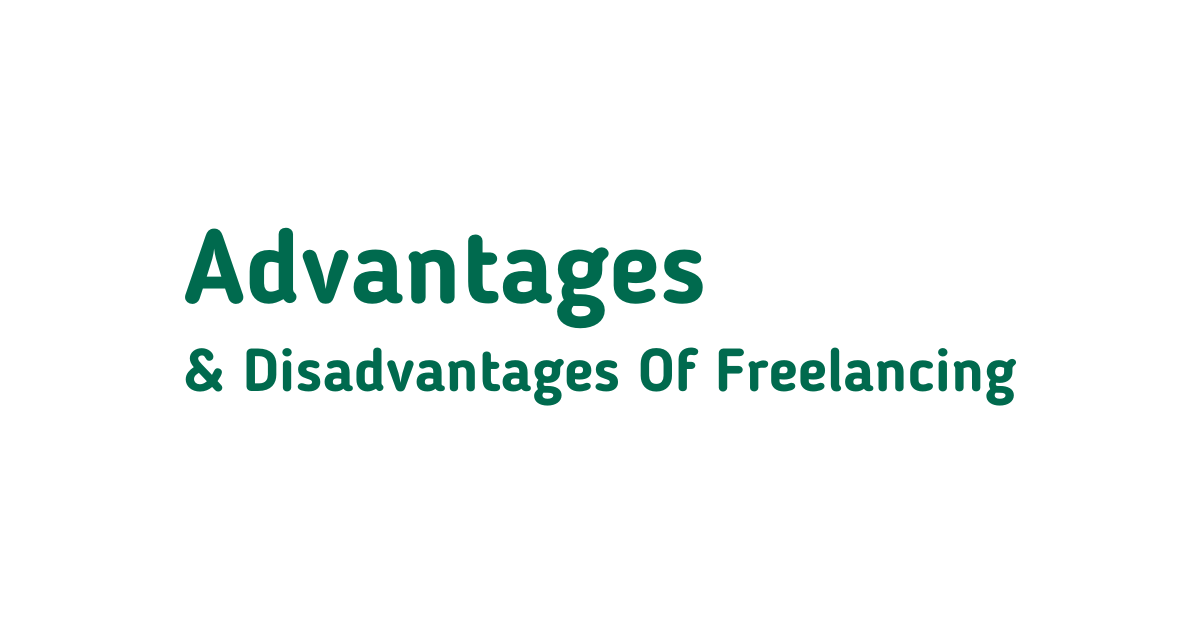Hello there, fellow freelancers, aspiring freelancers, and curious readers! If you’re considering embarking on a freelancing journey or are already knee-deep in the world of freelancing, this blog post is tailor-made for you. I’m excited to share my personal experiences and insights into the pros and cons of freelancing helping you navigate the exhilarating but sometimes tumultuous waters of freelancing. So, grab a cup of your favorite beverage, get cozy, and let’s dive right into the exciting world of freelancing!

Before we delve into the nitty-gritty details of freelancing, here are some key takeaways to keep in mind:
- Freelancing offers flexibility and autonomy, but it comes with the responsibility of managing your own business.
- The advantages of freelancing include freedom, potential for higher earnings, and a diverse client base.
- On the flip side, disadvantages include income instability, lack of job security, and the need for self-discipline.
- Deciding if freelancing is right for you requires careful consideration of your skills, personality, and financial situation.
Freelancing can be a rewarding alternative to traditional employment, but it’s not without its challenges.
Now, let’s explore the world of freelancing and uncover its many facets.
The Advantages of Freelancing
Flexibility and Autonomy (Pros of Freelancing)
One of the most enticing aspects of freelancing is the unparalleled freedom it offers. Unlike traditional employment, where you’re tethered to a fixed schedule and location, freelancers have the flexibility to choose when, where, and how they work. For night owls or early birds, this can be a game-changer. It means you can work from the comfort of your home, a cozy café, or even while traveling the world. This level of autonomy allows you to align your work with your natural rhythms and personal life, creating a healthier work-life balance.
Furthermore, freelancers have the autonomy to select the projects they’re passionate about. You’re not constrained by the projects assigned to you by a boss; instead, you can actively seek out work that aligns with your skills and interests. This not only makes work more enjoyable but also contributes to personal and professional growth.
Potential for Higher Earnings (Pros of Freelancing)
When it comes to income potential, freelancing can be a lucrative endeavor. Many freelancers find that they can earn more per hour or project compared to traditional employees.This is particularly true for highly specialized skills or industries with a high demand for freelancers.
Additionally, freelancers have the freedom to set their own rates and negotiate with clients. As you gain experience and build a strong portfolio, you can steadily increase your rates. This upward trajectory can lead to a substantial income over time.
The Disadvantages of Freelancing
Income Instability (Cons of Freelancing)
While the potential for higher earnings is enticing, it’s essential to acknowledge the downside of freelancing: income instability. Freelancers don’t have the luxury of a steady paycheck. Instead, your income can vary from month to month, making financial planning a bit more challenging.
This variability can be particularly nerve-wracking for those who thrive on financial security. It’s essential to establish a financial safety net, which may include saving a portion of your earnings during prosperous months to cover leaner periods. Health insurance, retirement planning, and other benefits often provided by employers will also be your responsibility as a freelancer, adding to the complexity of financial planning.
Lack of Job Security (Cons of Freelancing)
In the realm of freelancing, job security is a rare commodity. Traditional employees often enjoy the assurance of a stable job as long as they meet their performance expectations. In contrast, freelancers are subject to the whims of the market. Clients may come and go, and there’s no guarantee that your current projects will lead to future work.
This lack of job security can be a significant source of stress, especially during economic downturns or slow seasons in your industry. As a freelancer, you need to be proactive in securing new clients and diversifying your income streams to mitigate the risk of financial hardship.
Is Freelancing Right for You?
Now that we’ve explored some of the primary advantages and disadvantages of freelancing, it’s time to reflect on whether freelancing is the right path for you. This decision should be based on your individual circumstances, goals, and personality.
Assessing Your Skills and Interests
First and foremost, assess your skills and interests. Are you highly skilled in a specific area that is in demand in the freelancing market? Do you have a passion for working independently and managing your own business affairs? Freelancing is most rewarding when your skills align with market demand, and you have a genuine interest in the work.
Analyzing Your Financial Situation
Your financial situation is another critical factor to consider. Do you have enough savings to cover your expenses during the initial stages of freelancing when income might be inconsistent? Are you prepared to handle your own taxes, healthcare, and retirement planning? Assessing your financial preparedness is essential to ensure a smooth transition to freelancing.
Self-Discipline and Time Management
Freelancers must possess a high degree of self-discipline and time management skills. Without a boss or office structure, it’s easy to become distracted or procrastinate. Ask yourself if you have the discipline to set and meet deadlines consistently. Time management tools and techniques can be invaluable for freelancers who want to stay on track.
Embracing Uncertainty
Finally, consider your tolerance for uncertainty. Are you comfortable with the idea that your income may fluctuate from month to month? Can you handle the pressure of seeking new clients and managing the ups and downs of the freelance market? Freelancing can be emotionally taxing for those who prefer stability and predictability.
Freelancing vs. Traditional Employment
To provide a comprehensive view of the freelancing landscape, it’s essential to compare it to traditional employment. Both paths have their merits and drawbacks, and the right choice for you depends on your unique circumstances.
Job Security and Stability
One of the most significant differences between freelancing and traditional employment is job security and stability. In a traditional job, you typically have the security of a regular paycheck, along with benefits such as health insurance and retirement plans. However, this comes at the cost of less autonomy and the potential for limited career growth.
On the other hand, freelancers enjoy greater freedom but must contend with income instability and the absence of traditional job benefits. It’s a trade-off between security and autonomy.
Income Potential
As mentioned earlier, freelancers often have the potential for higher earnings per project or hour worked. This can be especially appealing if you’re highly skilled in a niche market with high demand. Traditional employees, while enjoying job security, may find their earning potential capped by fixed salaries and limited opportunities for bonuses or commission-based income.
Work-Life Balance
Work-life balance is a critical consideration in today’s fast-paced world. Freelancers have the advantage of being able to set their own schedules and work from anywhere. This flexibility can lead to a more balanced and fulfilling personal life. Traditional employees, on the other hand, may have more rigid schedules and less control over their work environment.
FAQs: Your Freelancing Queries Answered
Now, let’s address some frequently asked questions about freelancing, covering additional aspects and nuances of this unique career path.
Q1: Can I freelance part-time while keeping my full-time job?
Yes, many individuals start freelancing part-time while maintaining their full-time job. This can be an excellent way to test the waters, build a client base, and supplement your income. However, be prepared for the demands of managing two work commitments simultaneously.
Q2: How do I find clients as a freelancer?
Finding clients often involves a combination of strategies. You can start by tapping into your network, creating an online portfolio, and using freelance platforms like Upwork and Fiverr. Networking events, social media, and referrals are also effective ways to connect with potential clients.
Q3: What are some tools for managing freelance finances?
Several tools and software can help you manage your freelance finances efficiently. Consider using accounting software like QuickBooks or FreshBooks to track income and expenses. Additionally, apps like Expensify can simplify expense reporting, while platforms like PayPal and TransferWise facilitate payments from clients.
Q4: How do I deal with the isolation of freelancing?
Freelancing can be isolating, especially if you work from home. To combat isolation, consider co-working spaces, networking events, or joining online communities for freelancers. It’s essential to stay connected with others in your industry to combat feelings of loneliness.
Q5: Is freelancing a viable long-term career?
Yes, freelancing can be a viable long-term career choice if you have the right skills, determination, and ability to adapt to market changes. Many freelancers enjoy sustained success and even build thriving businesses over time. However, it requires careful planning, financial discipline, and continuous self-improvement.
In the world of freelancing, the journey is as important as the destination. While freelancing offers unparalleled freedom and income potential, it also comes with its fair share of challenges, including income instability and the need for self-discipline. Determining whether freelancing is right for you requires a deep dive into your skills, financial readiness, and personality.
Ultimately, freelancing is a path that suits those who crave autonomy, are willing to embrace uncertainty, and have a strong work ethic. It’s a journey filled with both triumphs and tribulations, but for many, the pros outweigh the cons, making freelancing a rewarding and fulfilling career choice.
So, as you contemplate whether to take the freelancing plunge, remember that your path is unique, and the decision should align with your personal goals and aspirations. Whether you choose freelancing or traditional employment, may your career be filled with success and satisfaction.
